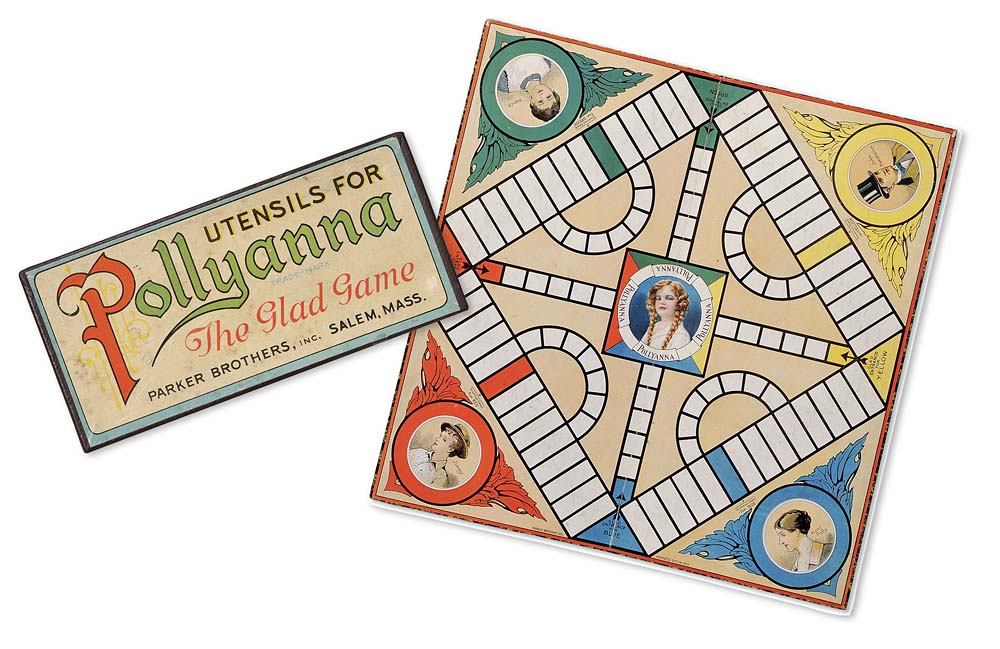Vintage Board Games | Antiques and Collectibles
To stoic Yankee stock, I’m that most unnatural of New Englanders: a person who wears her heart on her sleeve. I exude enthusiasm and fail to mask disdain. A feeler and a talker, I understand, and at times, over-share. It’s no wonder I’ve never been much of a card player. A close-to-the-vest stance seems to […]

Parker Brothers introduced Pollyanna, based on the best-selling Eleanor H. Porter novel, in 1917. It was a pursuit game modeled on Parcheesi.
Photo Credit : Inc., SkinnerTo stoic Yankee stock, I’m that most unnatural of New Englanders: a person who wears her heart on her sleeve. I exude enthusiasm and fail to mask disdain. A feeler and a talker, I understand, and at times, over-share. It’s no wonder I’ve never been much of a card player. A close-to-the-vest stance seems to me more work than play. But board games are another story…
With board games, you lay it all on the table–literally. Whereas cards pit foe against foe in a silently strategic tete-a-tete, a board game unfolds on a perfectly level playing field — and a colorful one at that. Board games delight the soul and the senses alike: the symmetry of carefully arranged blocks; a bright palette; smooth, cool dice tumbling across your palm; that pleasing “clickety-clack” as they hit the table; then a calculated move; and finally, sitting back to watch the theater of the game play out. Who hasn’t spent a rainy afternoon this way? And that’s why antique and vintage board games are now prized collectibles.
The diversion of board games dates back 5,000 to 7,000 years, possibly to Nabataea (ancient Jordan) or the Aratta or Jiroft civilization (in ancient Iran, before the Persians). In modern times, mass-produced board games first appeared in the United States in the 1840s and were originally created to promote Christian morality. One popular game, The Mansion of Happiness, rewarded players for virtuous deeds and punished them for vices. You’ll still see this influence today in games such as Chutes and Ladders.
In the 1860s-1880s, New England entrepreneurs Milton Bradley and George S. Parker, founder of Parker Brothers, took the industry in a whole new direction, injecting the theme of wealth and prosperity. Bradley, a native of Vienna, Maine, had set up a lithography shop in Springfield, Massachusetts. To help support his business, he created a board game called The Checkered Game of Life. It would later become The Game of Life, one of Milton Bradley’s biggest successes. Parker, of Salem, Massachusetts, believed that games should be played simply for enjoyment. He created games based on events of the day: Klondike replicated the Alaskan gold rush; War in Cuba, the Spanish-American War. The Great Depression was the inspiration for what is arguably the most-played board game in the world: Monopoly.
Then the 1960s and ’70s saw the invention of games based on pop-culture icons, such as rock bands, movies, and TV shows: the Beatles, Planet of the Apes, and Laugh-In, to name just a few — and a whole new generation got hooked on them. “Antique and vintage board games have crossover appeal,” says Garrett Sheahan, a collectibles specialist at Skinner, Inc. “For some collectors, it’s the early lithography. For others, it’s the memory of playing these games as kids. Then there are those who love the pop-art design aesthetic of the later games, like Twister.”
For would-be collectors, a few tips to remember: First, don’t confuse board games with game boards. Game boards (such as checkerboards and cribbage boards) are hand-wrought examples of Early American folk art, and they carry hefty price tags. But board games are far more reasonable: $50 to $1,000 for most examples. Also, look for games in near-perfect condition, without stains, tears, or warping. Later examples should have all their pieces intact, as well.
In the high-stakes world of antiques, it’s not always easy to steer new collectors toward a category that’s fun, approachable, and affordable. But with board games, everyone can play.
Catherine Riedel represents Skinner Auctioneers and Appraisers of Boston. 617-350-5400, 978-779-6241; skinnerinc.com


